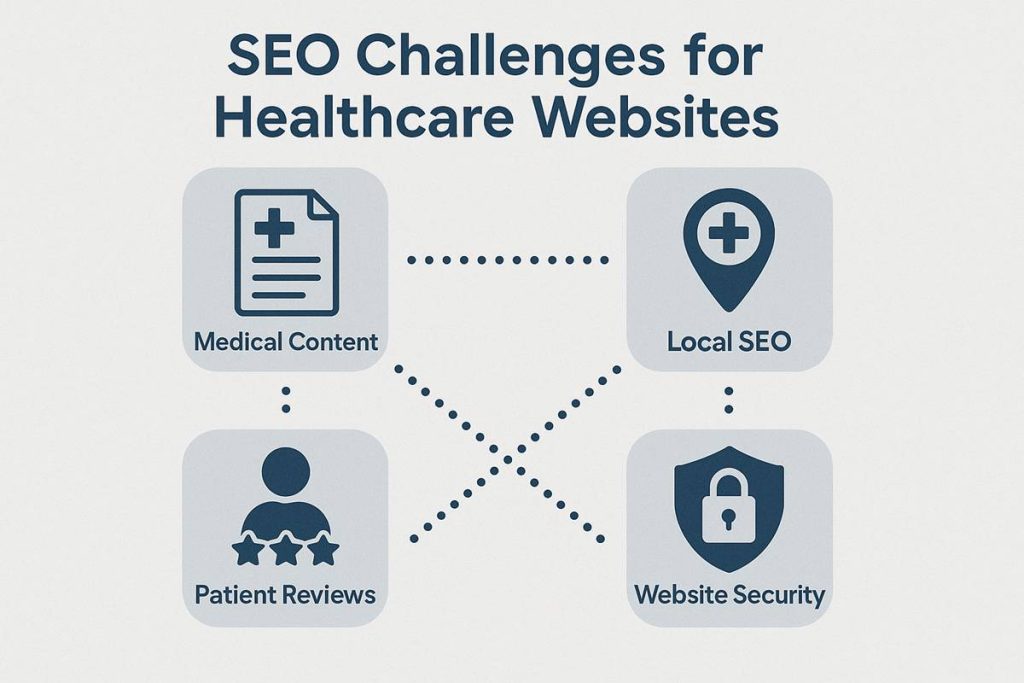Most healthcare websites don’t struggle with SEO because they’re lazy. In fact, Hospitals, clinics, and private practices often understand the value of ranking on Google. But healthcare SEO’s discipline is different from other industries—with higher stakes, stricter regulations, and far less room for error.
You’re not selling a product or service. You’re guiding real people through critical health decisions. That means trust, accuracy, and compliance aren’t just important—they’re non-negotiable. This is why working with someone who really knows this landscape makes all the difference.
You don’t just need any SEO help. You need someone who’s dealt with the nuances, the regulatory hoops, and the technical quirks of medical websites. Let’s talk about some of the biggest SEO headaches healthcare sites face—and why only a true healthcare SEO consultant can solve them.
Google Holds You to a Higher Standard (Thanks, E-E-A-T)
If you’re in healthcare, Google isn’t just checking for keywords and backlinks. It’s judging how trustworthy your content is.
This comes down to something called E-E-A-T: Experience, Expertise, Authoritativeness, and Trustworthiness.
For healthcare sites, Google expects:
- Verified medical authorship(e.g., MDs, RNs, certified specialists)
- Credible sourcing of information(peer-reviewed, government, or reputable medical institutions)
- Transparent bios and credentials for doctors and specialists
- Updated, factual, and responsible content
If your content doesn’t pass these sniff tests? You’ll struggle to rank—no matter how good your SEO “basics” are. This is one of those problems a generic SEO agency might totally miss. But a seasoned healthcare SEO consultant will catch it within minutes of reviewing your site.
They’ll know how to build credibility signals that both Google and real patients recognize.
Technical SEO Is Often a Mess (and Hard to Spot)
Here’s the quiet killer: a lot of healthcare websites look fine on the surface. They’ve got service pages, some blog content, maybe even decent speed. But under the hood? Broken links, bloated code, indexing issues, duplicate pages from old systems—it’s all there, quietly dragging performance down.
These technical problems are usually invisible to anyone without a trained eye. You won’t catch them by just clicking around. This is where you want a technical SEO consultant—someone who’s lived inside crawling tools, audit spreadsheets, and server-side settings. They’ll dive into your architecture and fix what’s silently killing your rankings.
Because if your site isn’t healthy on the inside? No amount of keyword magic will save it.
Content That Sounds Like a Robot (or a Textbook)
Another big one: most healthcare content is either too clinical or too generic. You’ve got two extremes:
- Dry, jargon-heavy pages written like a medical paper
- Fluffy, SEO-stuffed blogs that sound like they were written by AI (or worse—a non-medical freelancer who Googled everything)
Neither will earn trust nor perform well in search results in the long run. Patients want to feel understood, not talked down to. And Google wants to see that you know what you’re talking about. Balancing both is tricky—and it’s not something you can outsource to just anyone.
A healthcare SEO consultant brings that balance. They’ll know how to collaborate with your internal experts, translate their knowledge into patient-friendly content, and make sure that content also satisfies Google’s algorithm.
It’s not just copywriting—it’s strategy with clinical nuance.
You’re Competing With Giants (And Need Smarter Positioning)
Let’s face it—you’re not the only clinic in town. And you’re definitely not the only one with a website. In manyareas, you’re up against major hospitals, national chains, WebMD-style content farms, and VC-backed startups pumping out pages like there’s no tomorrow. Trying to beat them all with a basic SEO game plan? Good luck. What you need is positioning. A real content and keyword strategy that:
- Targets underserved local or niche terms
- Captures high-intent queries that big players miss
- Builds authority without trying to out-publish the entire internet
- Do a competitive gap analysis to find opportunities where your domain can realistically rank and grow authority.
This is where a specialized technical SEO consultant works hand-in-hand with content strategy. They don’t just say “let’s write more.” They say, “here’s what to write, why it matters, and how we’ll make it stick.”
Compliance Can Choke Your Marketing If You’re Not Careful
You can’t just make bold claims or toss around “cure” and “guaranteed results” like you’re selling protein shakes.
In healthcare, HIPAA, FDA, and local advertising compliances all matter. It affects your digital presence and SEO strategy—impacting your content, UX, calls-to-action, and even how you handle online appointments or contact forms.
That’s a minefield for a regular agency.
A healthcare SEO consultant knows where the lines are. They’ll make sure your site ranks without putting you at risk for legal trouble—or scaring off compliance-conscious patients.
The Funnel Is Longer, So Tracking Needs to Be Smarter
People don’t book surgery like they order shoes. Their decision-making journey is longer, more emotional, and more complex.
Your visitors are often:
- Reading multiple webpagesto evaluate providers
- Returning through branded search or direct traffic, making attribution murky
- Googling symptoms before they even know what procedure they want
- Calling your front desk instead of filling out a form
If your tracking isn’t airtight, you’ll have no idea what’s working.
This is another job for a specialist—someone who knows how to:
- Set up proper event tracking across pages
- Attribute offline calls or bookings back to the original SEO source
- Report in a way that actually tells you what to do next
Final Thought: When SEO Actually Feels Like a Partnership
You don’t need more fluff or vague promises. You need someone who knows what they’re doing—who can look at your site, your space, and your goals and say, “Alright. Here’s where the real problems are, and here’s how we fix them.”
That’s what a real healthcare SEO consultant brings to the table. No gimmicks. No guessing. Just smart, honest strategy—and the experience to make it stick. So, if your site looks fine but still isn’t ranking, your content feels lifeless, and your leads have plateaued.
It might be time to stop doing SEO the “usual” way—and bring in someone who’s been in the weeds with healthcare sites like yours. Because this space? It’s too complex to just wing it.



